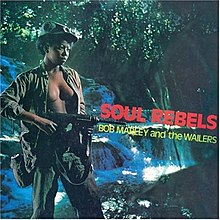Soul Rebels is the second studio album by the Wailers, their first album to be released outside Jamaica. The Wailers approached producer Lee "Scratch" Perry in August 1970 to record an entire album, and the sessions took place at Randy's recording studio (also known as Studio 17)[1] above Randy's Record Mart at 17 North Parade in Kingston, Jamaica,[2] until November. First issued in the UK by Trojan Records in December 1970, the album has since been re-released several times on several different labels. Perry's production is sparse and haunting, only featuring guitar, bass, drums, electronic organs, and vocals with no horns or other embellishments.
| Soul Rebels | ||||
|---|---|---|---|---|
 | ||||
| Studio album by | ||||
| Released | December 1970 | |||
| Recorded | August – November 1970 | |||
| Studio | Randy's Studio 17, Kingston, Jamaica | |||
| Genre | Reggae | |||
| Length | 33:09 | |||
| Label | Trojan | |||
| Producer | Lee Perry | |||
| Bob Marley and the Wailers chronology | ||||
| ||||
Songs
editThe first track, "Soul Rebel", was from the first collaboration of Perry and Marley.[3] Marley initiated the idea for the song, and Perry arranged and co-wrote the music as Marley dictated the lyrics.[4]
Reception
edit| Review scores | |
|---|---|
| Source | Rating |
| Allmusic | [5] |
Writing in Newsday in 1973, Robert Christgau found Soul Rebels superior to Marley and the Wailer's only American release at the time, Catch a Fire.[6]
Allmusic gave Soul Rebels a glowing retrospective review, calling it "a strange and wonderful set of early reggae that at times plays fast and loose with the already established conventions of the genre".[5]
Cover
editAccording to the book, I & I: The Natural Mystics: Marley, Tosh and Wailer by Colin Grant, the band was not happy with the "soft porn" look of the album cover, clashing as it did with their sensibilities, and were upset that they weren't consulted on its look.[7]
Track listing
editOriginal album (1970)
editAll tracks are written by Bob Marley, except where noted
| No. | Title | Writer(s) | Length |
|---|---|---|---|
| 1. | "Soul Rebel" | 3:19 | |
| 2. | "Try Me" | 2:45 | |
| 3. | "It's Alright" | 2:34 | |
| 4. | "No Sympathy" | Peter Tosh | 2:13 |
| 5. | "My Cup" | James Brown | 3:34 |
| 6. | "Soul Almighty" | 2:42 |
| No. | Title | Writer(s) | Length |
|---|---|---|---|
| 7. | "Rebel's Hop" | Curtis Mayfield, Norman Whitfield, Barrett Strong, Marley | 2:38 |
| 8. | "Corner Stone" | 2:28 | |
| 9. | "400 Years" | Tosh | 2:33 |
| 10. | "No Water" | 2:08 | |
| 11. | "Reaction" | 2:41 | |
| 12. | "My Sympathy" | 2:41 |
The Definitive Remastered edition (2002)
edit| No. | Title | Writer(s) | Length |
|---|---|---|---|
| 1. | "Soul Rebel" | 3:19 | |
| 2. | "Try Me" | 2:45 | |
| 3. | "It's Alright" | 2:34 | |
| 4. | "No Sympathy" | Tosh | 2:13 |
| 5. | "My Cup" | Brown | 3:34 |
| 6. | "Soul Almighty" | 2:42 | |
| 7. | "Rebel's Hop" | Mayfield, Whitfield, Strong, Marley | 2:38 |
| 8. | "Corner Stone" | 2:28 | |
| 9. | "400 Years" | Tosh | 2:33 |
| 10. | "No Water" | 2:08 | |
| 11. | "Reaction" | 2:41 | |
| 12. | "My Sympathy" | 2:41 | |
| 13. | "Dreamland" | Bunny Wailer | 2:44 |
| 14. | "Dreamland" (version) | Wailer | 2:36 |
| 15. | "Dracula" | Lee "Scratch" Perry | 2:55 |
| 16. | "Soul Rebel" (version 4) | 2:54 | |
| 17. | "Version of Cup" | Perry | 3:13 |
| 18. | "Zig Zag" | Perry | 3:24 |
| 19. | "Jah Is Mighty" | 2:26 | |
| 20. | "Brand New Second Hand" | Tosh | 3:11 |
| 21. | "Brand New Second Hand" (version) | Tosh | 3:05 |
| 22. | "Downpresser" | Tosh | 3:16 |
JAD Remastered edition (2004)
edit| No. | Title | Length |
|---|---|---|
| 13. | "Jah Is Mighty" | 2:26 |
| 14. | "Soul Rebel" (version 4) | 2:52 |
Also "No Sympathy (Version)" (replaces "My Sympathy", due to error)
References
edit- ^ Wayne Robins (8 May 2004). "VP Celebrates 25 Years". Billboard. p. 21.
- ^ John Masouri (11 November 2009). Wailing Blues: The Story of Bob Marley's Wailers. Omnibus Press. p. 154. ISBN 9780857120359.
- ^ David Katz, People Funny Boy - The Genius Of Lee 'Scratch' Perry, p. 116: "Shortly after the success of 'Duppy Conqueror,' Perry and the Wailers scored another hit with 'Soul Rebel,' ... The Wailers later issued alternate versions of the song with entirely different lyrics as 'Run For Cover,' which surfaced on ..."
- ^ Kevin O'Brien Chang, Wayne Chen, Reggae Routes: The Story of Jamaican Music, 1998, p. 167: "We started to work together and the ideas started to flow 'till we made the tune 'Duppy Conqueror'. Then he came up with the idea 'I'm a rebel, soul rebel' and I arranged the music for that song 'Soul Rebel'. He wrote the lyrics."
- ^ a b Soul Rebels at AllMusic
- ^ Christgau, Robert (6 May 1973). "An Outsider's Guide to the Inside World of Reggae". Newsday. Retrieved 17 October 2018.
- ^ I & I: The Natural Mystics: Marley, Tosh and Wailer, Colin Grant (2011). Random House. p.179